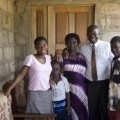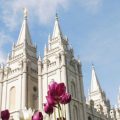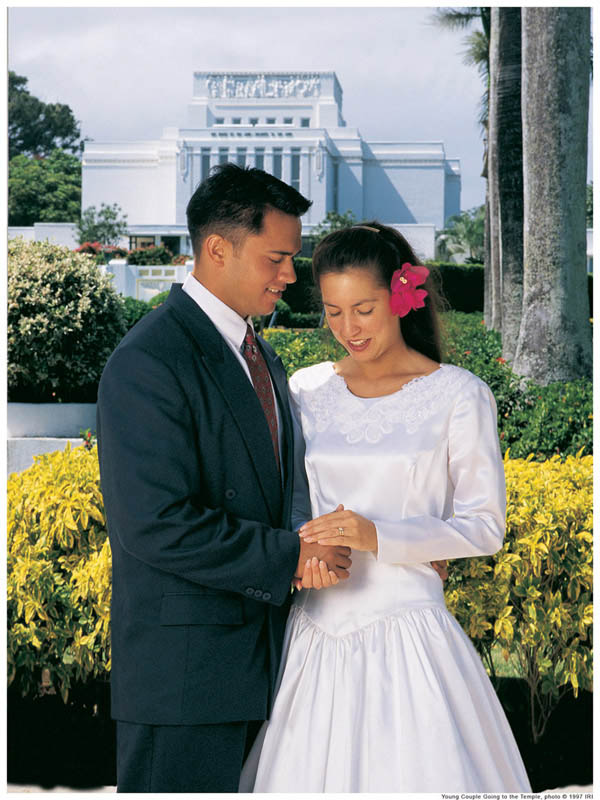Mormon genealogy has gained world-wide attention due to the Family History Center libraries found around the world, the large genealogy library in Salt Lake City, Utah, and the extensive genealogy website, all of which are free to people regardless of religion. The Church of Jesus Christ of Latter-day Saints, whose members are sometimes informally called Mormons, considers genealogy more than just a hobby. It is a sacred obligation. Mormon genealogy libraries are not just for Mormons; anyone can visit them and no one will make an effort to convert you unless you want them to. They exist just as places to do Mormon genealogy or any other type of genealogy.
Mormon beliefs include the knowledge that families are meant by God to last forever. Because returning to God is a place of great joy, we will naturally want to share our joy with those we love most. God would never ask us to begin our heavenly life by trying somehow to fall out of love with those He already asked us to make the center of our lives after God and Jesus Christ. He made families important because he intended for them to last forever.
Because Mormons believe that families are forever, our ancestors are an important part of our eternal families. Mormon genealogy helps us to identify those people to whom we are eternally linked and allows us an opportunity to get to know them by learning something of their lives. In addition, it allows the Mormon genealogist to serve his or her ancestors in a way unique to modern Christianity, but practiced in New Testament Christianity.
In 1 Corinthians 15, the apostle Paul chided the Christians for having fallen into false doctrine. The apostasy had already begun and some were teaching there was no resurrection of the dead. Paul reminded them that Jesus rose from the dead, and therefore, that proved there was indeed resurrection. He created a logical argument demonstrating that resurrection must be an essential part of God’s plan. He then pointed out, in verse 29, that if they were doing baptisms for the dead, then clearly there was a resurrection; otherwise what was the point of doing baptisms for the dead? He didn’t tell them to stop doing it. Instead, Paul used it to prove his point, and you don’t use false doctrine to prove true things.
Since Paul didn’t bother to stop and explain what baptisms for the dead are, it is clear his listeners already knew and were probably even doing it themselves. Many Christian groups have admitted that it appears to be a legitimate practice, but since they don’t understand what it is, they can’t do it.
Mormon genealogy is a doctrine in part due to baptism for the dead. Mormon revelation has helped us to understand what it means, although the meaning is fairly clear even from the Bible if one takes the time to study baptism.
Jesus taught that we must be baptized in order to enter the kingdom of God. He also taught that God is a fair and loving God. If we combine these two ideas, we see that in order for God to be kind and loving, He must provide an equal opportunity for everyone to return to His presence. This doesn’t mean He has to let everyone in—no unclean thing can enter into Heaven, the Bible teaches. It does mean that everyone deserves a fair chance.
Many die without having had a chance to receive the ordinance of baptism, an ordinance so critical even Jesus received it despite having no sins from which to be cleansed. Some die before they’re old enough to choose to be baptized. Some never found a church they felt was the true church and so they did not feel comfortable being baptized there. Some died never even having heard of baptism or Jesus Christ and others died before Jesus was born, so they could not have accepted Him as their Savior. Christian churches often struggle to explain how a loving God would place a child of His into a situation where He will have no hope of redemption.
Mormon beliefs answer this question. People who died without receiving the saving ordinance of baptism by one with the authority to do so can receive a proxy baptism. Because baptism must be done on earth, a living person can be baptized in the name of the dead person. The person doing the baptism must have been baptized himself and be worthy to perform the ordinance. Mormons allow older teenagers to do this ordinance. Baptism and confirmation can be done by teens; all other vicarious ordinances must be done by adults who have received those ordinances for themselves.
Mormon genealogy provides the names for these ordinances, since we are taught that we must only submit names of our own ancestors unless we have permission from the nearest living relative. Receiving the baptism does not automatically turn the person into a Mormon. No one is baptized in his lifetime without first desiring to be baptized and without having become worthy to do so. In the same way, the ancestor must agree to be baptized. Since we have no way to know if they’ve agreed or not, God has made the process very simple. Every name submitted is baptized and the ancestor is free to accept or reject the ordinance. If he rejects it, it is as if it never happened. If he accepts it, he receives the blessings of the ordinance as if it had been done on earth.
This is not a second chance. It is meant for people who had no true opportunity to receive the ordinance in their lifetimes. However, only God knows who had a true opportunity, since only God can measure what we know, why we know it (or think we know something) and whether or not the Holy Spirit ever testified to us of the truth. For this reason, ordinances are done for anyone who died without them and God will take care of the rest.
On a personal note, I once asked someone of another faith how he would feel if Mormons did his ordinances after his death. He said, “Well, if I get up there and it turns out to be true, I’m going to be desperate to have the ordinances done. If it’s not true, God will ignore that you did it anyway. I really have nothing to lose, have I?”
The ancestors who are baptized by proxy are not listed on the membership rolls of the Mormon Church. After all, we have no way to know, in most cases, who did or did not accept the ordinance. It is simply recorded as having been done.
These proxy ordinances are done in Mormon temples by worthy Mormons. They are one reason temples exist and why they are considered very sacred. They are not open to the public because these ordinances are not tourist attractions and must be done in a sacred place. To enter a Mormon temple, one must have been a member of the Mormon Church for at least one year and be obeying God’s law at a high level. It is meant to be a place to escape the morality and pressures of the world and to enjoy a rest in a place of sacredness.
Mormon genealogy is one of my favorite doctrines. I love history and when I research my family, I don’t just collect the required statistics. I put them in context of their historical time period, make a time line of the life so I can see the story hidden in the statistics, and try to see them as real people…because they are. Someday I will meet every one of them and we will be connected forever by a loving God who values the families He created.
The late Terrie Lynn Bittner—beloved wife, mother, grandmother, and friend—was the author of two homeschooling books and numerous articles, including several that appeared in Latter-day Saint magazines. She became a member of the Church at the age of 17 and began sharing her faith online in 1992.







